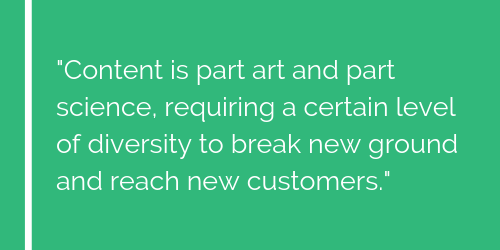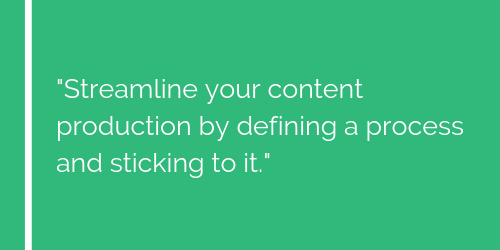If you find it increasingly difficult to manage and maintain a regular content publishing schedule for your brand, then you’re not alone. Healthy Content works with brands to solve this exact problem, so we understand the content challenges most companies are facing. For the most part, all of us are up against the same sets of struggles in content production.
Based on years of working with clients, creating content and coming up with calendars and strategies, we’ve noticed there are five main pain points clients reveal to us over and over again.
Here, we’ll go over these top five content production challenges that all brands struggle with. We’ll also discuss how aligning yourself with a content agency can solve these challenges.
Here are the five general areas that brands struggle with when it comes to content:
- Planning: Not having enough time to produce the volume of high-quality content you hope for
- Researching: Not knowing how to diversify your content strategy
- Scheduling: Not keeping a consistent publishing schedule
- Systematizing: Not being able to streamline the content production process so it gets done faster
- Assessing: Not knowing what’s working and what to change
1. Planning: Not Having Enough Time
It always seems like there’s never enough time. The to-do list is never-ending and, if anything, keeps getting longer. It’s a struggle we face in every aspect of life, including marketing. But with the right content plan and system, you can become more efficient at content production, freeing up time for business development.
When you feel the crunch of not being able to spend enough time on your content, whether it’s your company blog or your website content, it’s likely because you don’t have a plan. Or you do have a plan, but you’re not following it.
When you feel like there’s never enough time to execute a content plan, let alone develop one, here’s what you can do:
- Set realistic expectations and start a schedule you know you can stick to.
- Publish less frequently but at higher value.
- Get pillar content down first that addresses key aspects of your product’s solutions.
Working with a content agency can help you free up time by putting the responsibility for planning and producing the content in the hands of a trusted partner.
2. Researching: Diversifying Content Strategy
Feeling like you’re in a content rut? As creatures of habit, we’re prone to stick with ways that are tried and tested. But your content strategy is one area where it’s ok to branch out and try new methods and concepts. Content is part art and part science, requiring a certain level of diversity to break new ground and reach new customers.
If you have a consistent message you want to communicate but want to present it in different ways, bringing in an agency partner as your second set of eyes could get your brand’s creative juices flowing.
If you feel like your content isn’t diverse enough, try the following:
- An article series of tips or steps.
- A long-form ultimate guide to using your product.
- Social media posts for each “tip” or “step” from a blog post.
- Topics that aren’t directly related to the product you’re selling but still interest your audience.
A lot of diversifying your content means you need to think outside the box. Know that web traffic can find you in indirect ways. For example, a yoga studio might publish a post on “Trying New Exercise Routines”, which could get someone interested in yoga if they’re looking to try something new.
Don’t have time for research? A content strategist can overhaul your content plan and find new opportunities for fresh topics that consumers find valuable.

3. Scheduling: Maintaining a Consistent Publishing Calendar
As much as diversity is an asset, there’s something to be said for consistency as well. It takes commitment as a brand and dedication as a department to stick to a consistent publishing schedule. Producing high-quality content consistently is a reflection of your brand, not to mention important for establishing long-term organic search authority.
When you can’t keep a schedule on pace, here’s what to do:
- Put it in the team’s calendar—don’t treat content as something separate from other operations.
- Set realistic expectations such as one post every four weeks, then gradually increase when you get a system in place.
- Make one person responsible and give them support.
A content agency can develop a full content calendar based on topic and keyword research, giving you an exact content recipe for the next 6-12 months.
4. Systematizing: Streamlining the Content Production Process
You know the type of content you want to offer current and potential customers, and you know the types of topics they’re looking for. But what’s the process of actually producing the content from planning to publishing?
There’s a lot that goes into to producing one piece of content—it’s a time-consuming process when done properly (following a quality assurance checklist from start to finish). That’s why you need a system with a well-defined protocol involving specific people at specific points with specific responsibilities.
When you feel like you don’t have a content system you adhere to, try this:
- Replicate existing systems from content experts.
- Ask for input from your team.
- Break the content production process into steps and define what goes into each phase.
- Develop a checklist and use it.
The truth is, there are no tricks to streamlining your content production process. It’s just a matter of defining the process and then actually sticking to it. Content agencies have proven content processes already in place that you can leverage.

5. Assessing: Knowing What’s Working and What to Change
Once you’ve got your content plan in place, and you’re consistently producing high-quality yet diverse content, you now need to assess the results. Without an assessment phase, you could find yourself producing content that isn’t as effective as it could be.
Here are some ideas to keep in mind about content assessment:
- Keep track of organic web traffic to each blog post, content page or article.
- Look for common themes among high-traffic pieces.
- Know that there is no perfect science and it can be hard to replicate the same success.
- Learn from underperforming content as indicators of where to refocus.
Assess not only your content’s quality but your overall system from planning to publishing. This is where you could benefit from working with a content agency that can share your content pain and give you a fresh perspective.
Sharing Your Content Pain
Talk about it, share it and make sure your team is actively involved in content creation, or at least providing input. If the culture treats content like it’s an important part of the brand, then the mentality around it will shift and it will get done.
Content agencies, like Healthy Content, can supplement your content needs. You can either hire an agency to do all the heavy-lifting, or you can rely on their content creation expertise to help establish your own internal content processes. Over time, you can build an in-house team of your own.
Content agencies exist to share your marketing pain and resolve your content challenges. Contact Healthy Content today to learn more about the best way to work together for your company’s marketing goals.









